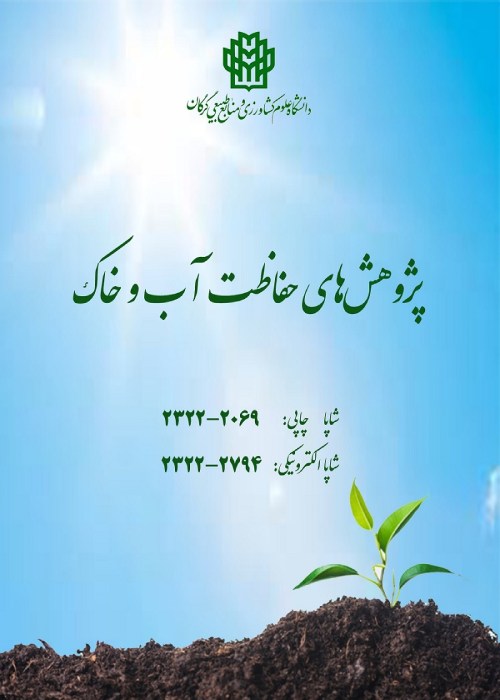Effects of Soil Tillage Systems and plant Residue Management on Unsaturated Hydraulic Conductivity of soil in Wheat-Corn Rotation
Author(s):
Abstract:
Background And Objectives
Soil is the most important factor on agriculture production. Tillage operation has affected on crop production due to soil characteristics. Tillage systems changed water infiltration of soil. incorporation of plant residual improved infiltration of soil to water. In reduced tillage system stability of soil aggregation and water infiltration rate was more than conventional tillage. Intensive tillage operation during the crop seeding and ignore of soil organic matter management, caused to soil compaction of agricultural lands in Iran. It is postulated that tillage change from conventional to conservation will be necessary. Conservation tillage caused to improving soil structure and water use efficiency, and decreasing production cast. The objective of this study was to evaluate the impacts of plant residual management and tillage systems on unsaturated hydraulic conductivity [K(ψ)] at semi arid region in the Fars province in the south of Iran.Materials And Methods
In this research, treatments of the field experiment included two kinds of residual management (residual retention on soil surface and complete removal residual from soil surface) as main factor and tree tillage practices: Conventional tillage (CT), minimum tillage (MT) and no tillage (NT) as sub factor. K(ψ) was measured at applied tensions (0, 2, 4, 8, 10 and 15 cm) by tension disk infiltrometer with six times(two point at each plot). A completely randomized block in split plot was designed with three replications.Results
The results showed in both soil, after first crop (wheat) and second crop (corn) by decreasing applied tension, K(ψ) increased significantly. Changes in K(ψ) in the soils of first and second crop, at tension of 0 m compared to 0.15 m increased 655 and 420 percent respectively. K(ψ) changed significantly(p1.5 mm, and for second soil, 19.22 and 80.77% respectively. Also in both soils, the percentage of water flow in macro pores (MacP) was affected with tillage treatments. So minimum value of this factor (%flow) 84.96 and 79.49% were occurred in CT in first and second soils respectively. Although the maximum of this factor(%flow) 90.47 in first and 81.95% in second soils were obtained with NT and MT respectively.Conclutions: We concluded that conservation tillage (MT and NT) was increased percentage of MacP in soil by decreasing of passing of machinery. In two soils MacP were more effective than micro pores at water flow in soil. Plant residual retention and decreasing of tillage operations were decreased unsaturated hydraulic conductivity in soil. Also decreasing of K(ψ) in corn soil was higher than of wheat soil. Corn production was destroyed soil structures more than wheat cropping.
Keywords:
Language:
Persian
Published:
Water and Soil Conservation, Volume:23 Issue: 3, 2016
Pages:
131 to 150
magiran.com/p1594391
دانلود و مطالعه متن این مقاله با یکی از روشهای زیر امکان پذیر است:
اشتراک شخصی
با عضویت و پرداخت آنلاین حق اشتراک یکساله به مبلغ 1,390,000ريال میتوانید 70 عنوان مطلب دانلود کنید!
اشتراک سازمانی
به کتابخانه دانشگاه یا محل کار خود پیشنهاد کنید تا اشتراک سازمانی این پایگاه را برای دسترسی نامحدود همه کاربران به متن مطالب تهیه نمایند!
توجه!
- حق عضویت دریافتی صرف حمایت از نشریات عضو و نگهداری، تکمیل و توسعه مگیران میشود.
- پرداخت حق اشتراک و دانلود مقالات اجازه بازنشر آن در سایر رسانههای چاپی و دیجیتال را به کاربر نمیدهد.
In order to view content subscription is required
Personal subscription
Subscribe magiran.com for 70 € euros via PayPal and download 70 articles during a year.
Organization subscription
Please contact us to subscribe your university or library for unlimited access!


